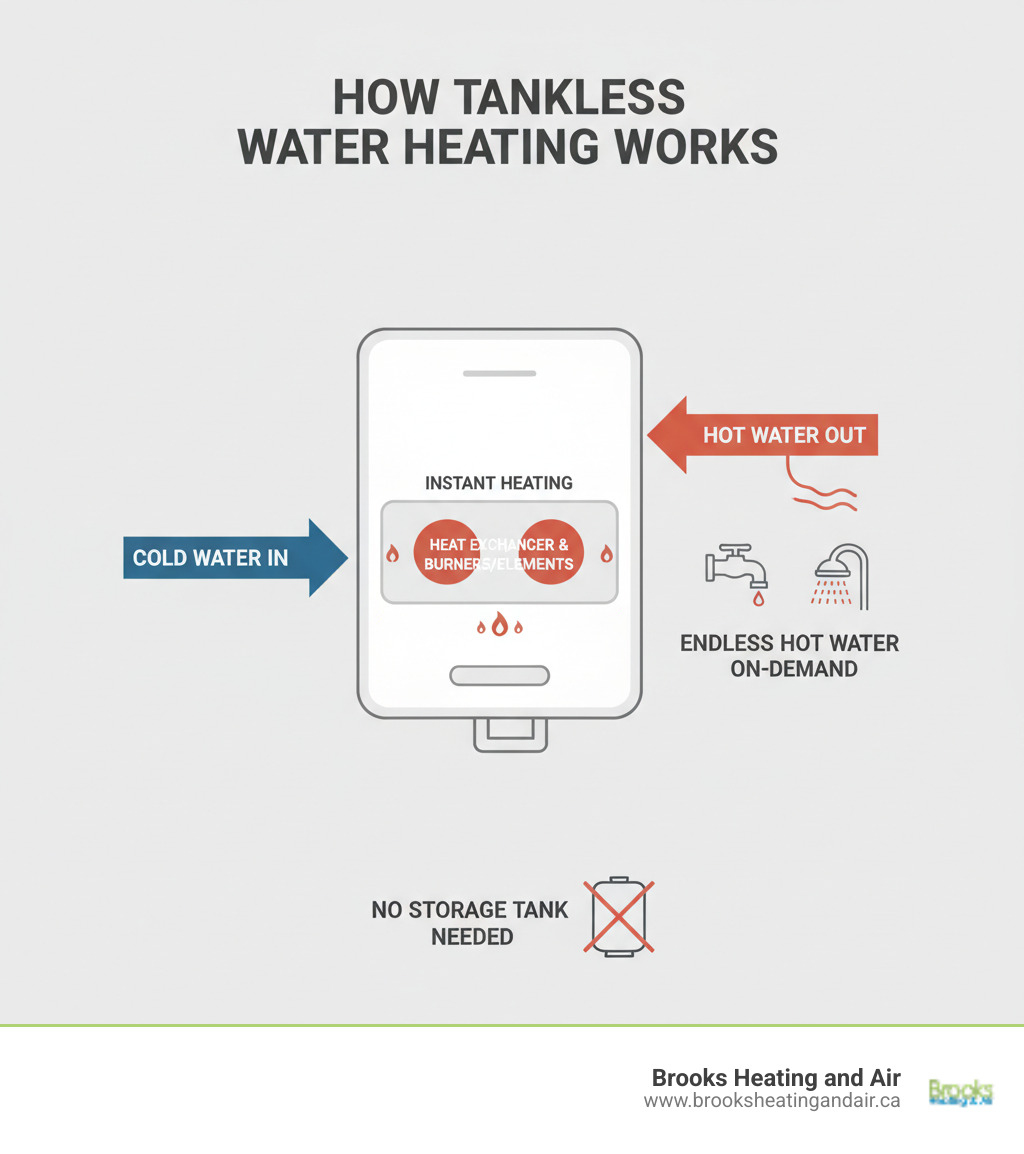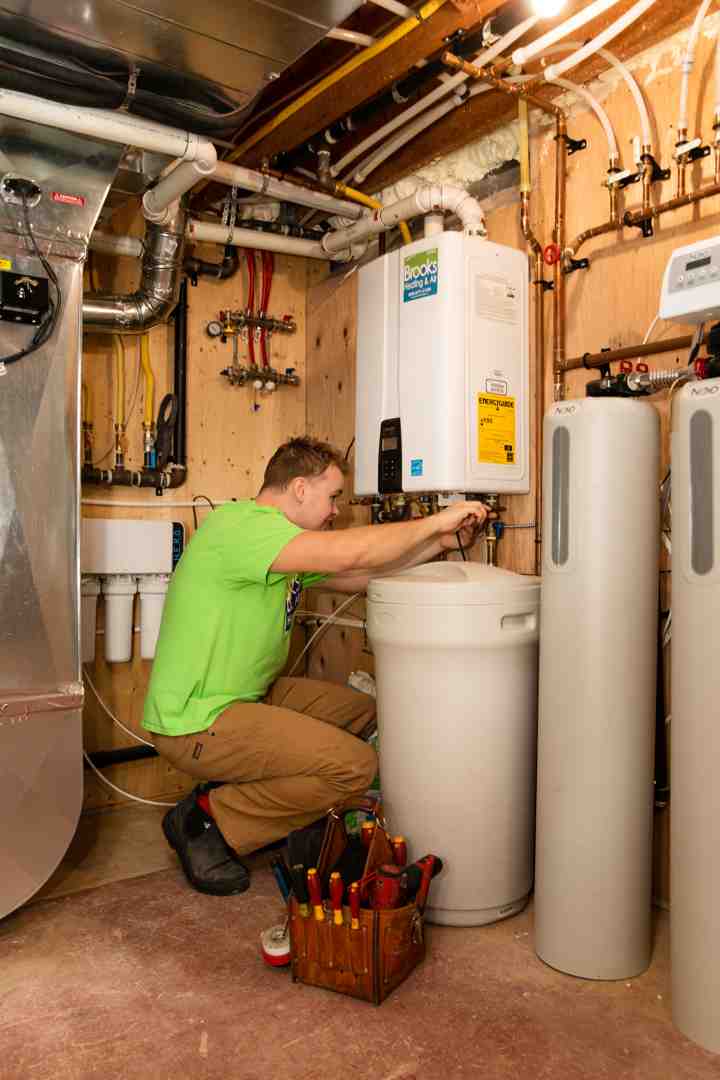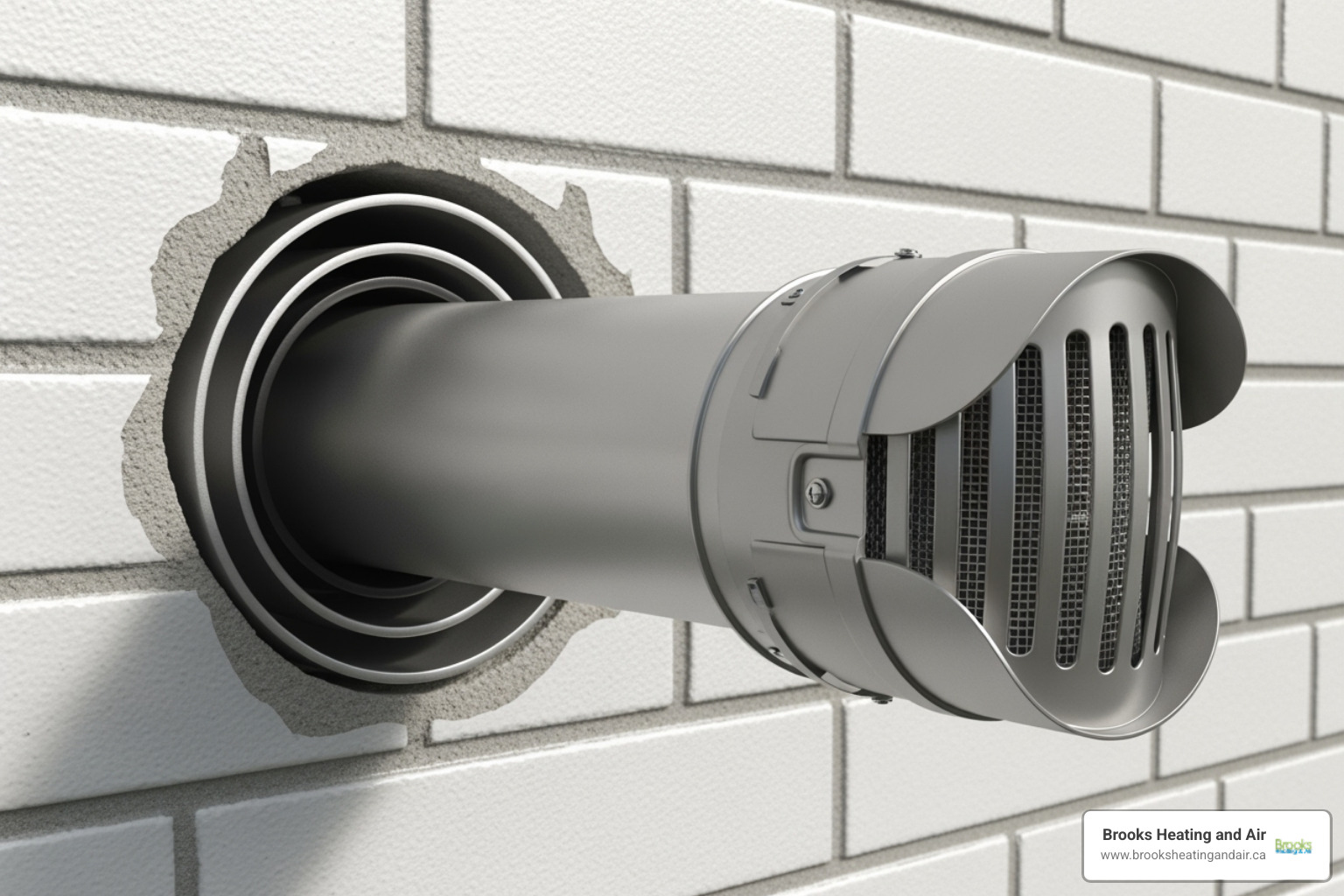Tankless Water Heater Installation: Your Step-by-Step Journey
Why Tankless Water Heaters Are Changing How Homes Get Hot Water
When you install tankless water heater systems, you get an endless supply of hot water. Unlike traditional tanks that constantly reheat 40-50 gallons, tankless units heat water on-demand. This shift to on-demand heating provides significant advantages:
- Endless Hot Water: Never run out of hot water, even with simultaneous use.
- Energy Savings: By eliminating standby heat loss, you can lower energy bills by up to 34%.
- Space-Saving Design: Compact, wall-mounted units free up valuable floor space.
- Longer Lifespan: Tankless units last 20+ years, compared to 10-12 years for tank heaters.
However, installing a tankless water heater is not a DIY project. It involves complex gas line work, electrical upgrades, and specialized venting that must adhere to local building codes. For example, a gas unit's high BTU demand (90,000-130,000) often requires upgrading the gas line from a 1/2-inch to a 1-inch diameter. For safety, efficiency, and to protect your warranty, professional installation is essential.

Why Go Tankless? Benefits and Pre-Installation Considerations
If you're tired of running out of hot water, it's time to install a tankless water heater. These systems heat water only when you turn on the tap, eliminating the wasted energy and limited supply of traditional 40-50 gallon tanks.
The benefits are compelling. Energy efficiency is a primary advantage; by eliminating standby heat loss, tankless units can be 24%–34% more efficient, saving a typical family $100-$200 annually. They also boast a longer longevity, lasting 20 years or more—nearly double the lifespan of a tank heater. The main attraction for many is unlimited hot water, allowing for simultaneous showers and appliance use without issue. Furthermore, their compact, wall-mounted design offers significant space savings, and with no large tank to fail, there's a reduced leak risk. Finally, lower energy consumption reduces your home's environmental impact.
For more guidance on choosing the right system, check out more info about the best tankless water heater models.
What to Consider Before You Install a Tankless Water Heater
Choosing the right tankless unit requires careful planning. A professional assessment is key to ensuring optimal performance.
- Sizing the Unit: This is critical. We determine the necessary flow rate (gallons per minute, or GPM) to see how many fixtures can run at once, and the required temperature rise—the difference between incoming cold water and your desired hot water temperature.
- Household Demand: We assess your family size, number of bathrooms, and typical usage patterns to calculate your peak hot water needs.
- Fuel Type: The choice between gas (natural or propane) and electric impacts installation and operating costs. Gas units offer higher output, while electric units are simpler to vent.
- Venting Requirements: Gas units produce combustion gases that must be safely vented outside using specialized stainless steel or PVC piping. They cannot use old chimney flues.
- Home Infrastructure: Many homes need upgrades. Gas units often require a larger diameter gas line (e.g., 1-inch) to meet their high BTU demand. Electric units may need dedicated high-amperage circuits and an electrical panel upgrade.
Our team evaluates these factors to recommend the right system for your home. Explore your options in our guide to expert water heater installation in Milton ON.
Gas vs. Electric Tankless Water Heaters
Your choice between gas and electric affects installation, output, and operating costs.
| Feature | Gas Tankless Water Heaters | Electric Tankless Water Heaters |
|---|---|---|
| Energy Source | Natural Gas or Propane | Electricity |
| Output Capacity | Higher BTU ratings provide more hot water, faster | Lower output; may need multiple units for whole-home use |
| Venting | Requires specialized venting to exhaust combustion gases outside | No venting required—no combustion byproducts |
| Installation Needs | Gas line sizing (often requires upgrade), venting system, electrical outlet for controls | Dedicated high-amperage circuits and proper wiring |
Gas heaters are powerful, with high BTU ratings (90,000-200,000) that make them ideal for whole-home use, especially in colder climates. However, this power requires a properly sized gas line (often 3/4-inch or 1-inch) and a dedicated venting system for intake and exhaust.
Electric heaters are highly efficient and don't require venting, which can simplify installation. Their main challenge is the substantial amperage requirements. A whole-home unit can demand 100-150 amps, often necessitating an electrical panel upgrade and heavy-gauge wiring. Due to their lower output, larger homes might need multiple units.
The Professional Process to Install a Tankless Water Heater
While it may look simple, installing a tankless water heater is a complex job best left to professionals. The process involves precise gas, electrical, and plumbing work where mistakes can lead to safety hazards like gas leaks or carbon monoxide buildup. A DIY installation will almost certainly void the manufacturer's warranty and may not comply with local building codes.

At Brooks Heating and Air, our family-first philosophy means we treat your home with care, ensuring every installation is safe, efficient, and up to code. When we handle your expert water heater installation in Milton ON, you get the peace of mind of our 100% satisfaction guarantee.
Step 1: Preparation and Removing the Old Unit
Safety is our first priority. We begin by shutting off the main water supply and the gas or electricity to the existing heater. We then attach a hose to the drain valve and completely drain the old tank. Once empty, we carefully disconnect the water, gas, and electrical lines. Finally, we remove the old, bulky unit and ensure it is disposed of responsibly according to local regulations.
Step 2: Mounting the New Unit and Venting
Proper placement is key to performance and maintenance. We select a suitable location on a structurally sound wall, ensuring proper clearance from combustible materials as per manufacturer guidelines.
The unit is securely mounted using heavy-duty brackets. For gas units, venting is a critical step. Modern tankless heaters require dedicated venting, often a concentric system where one pipe brings in fresh air and another exhausts gases. We drill a precise opening through an exterior wall, install the vent pipes with the correct slope for drainage, and seal all penetrations to prevent drafts and moisture.

Step 3: Connecting Water, Gas, and Electrical
This step transforms the appliance into a functional system. We begin with water connections, installing new lines with isolation valves on both the cold inlet and hot outlet. These valves allow for easy future maintenance. A pressure relief valve, a critical safety component, is also installed per manufacturer specifications.
For gas units, the gas line connection is done with meticulous care. We install a shut-off valve and a sediment trap to protect the unit's components. Every connection is sealed and pressure-tested to ensure there are absolutely no leaks.
Electrical connections for a gas unit typically require a standard outlet for the controls. An electric tankless unit, however, needs a dedicated high-amperage circuit run directly from the electrical panel, which may require an upgrade. After all connections are made, we slowly turn on the water, then the gas, performing final leak checks before powering up the unit and commissioning it for use.
Safety, Challenges, and Post-Installation Care
When you install tankless water heater systems, especially in older homes, a few challenges can arise. These often include necessary gas line upgrades to a larger diameter to handle the higher BTU demand, or electrical panel upgrades to support the high amperage draw of electric units. Sometimes, complex plumbing rerouting is needed to connect the new unit. Our professional assessment identifies these needs upfront. After installation, we conduct thorough gas and water leak inspections to ensure every connection is secure.
Key Safety Precautions
Safety is non-negotiable during installation. The combination of gas, high-voltage electricity, and water demands professional expertise.
- Gas Line Safety: Improperly sealed connections can cause dangerous gas leaks. We use professional pressure gauges and leak detectors to ensure every joint is secure.
- Electrical Safety: Electric units require dedicated high-amperage circuits and wiring to prevent fire hazards. All work is performed to meet the National Electrical Code.
- Carbon Monoxide Risk: Gas heaters produce carbon monoxide. Proper venting is essential to exhaust this gas safely outside. We also recommend installing CO detectors near the unit.
- Following Instructions: We adhere strictly to manufacturer instructions and local building codes for every installation. This ensures safe operation, validates your warranty, and guarantees the system will pass inspection.
Maintaining Your New Tankless Water Heater
Regular maintenance ensures your tankless water heater runs efficiently for its full 20+ year lifespan. The most important task is annual flushing to remove mineral buildup (limescale) from the heat exchanger, especially in areas with hard water. This process, also called descaling, prevents efficiency loss and damage.
During a professional tune-up, we also perform other key tasks:
- Cleaning intake filters to ensure proper air and water flow.
- Inspecting vent pipes for blockages or damage.
- Checking all connections and testing safety devices.
Think of maintenance as insurance for your investment. Schedule your tankless water heater maintenance in Georgetown ON to keep your system in peak condition and ensure decades of reliable hot water.
Frequently Asked Questions about Tankless Water Heaters
Considering a switch to tankless? Here are answers to the most common questions we hear from homeowners.
How much more efficient is a tankless water heater?
Tankless water heaters are 24%–34% more energy-efficient than traditional tank models because they eliminate standby heat loss—the energy wasted keeping stored water hot. By heating water only on demand, they reduce wasted energy, which can save a typical family $100-$200 annually on utility bills. It's a smarter way to use energy that benefits your wallet and the environment.
How long does a tankless water heater last?
With professional installation and annual maintenance, a tankless water heater can last 20 years or more. This is nearly double the 10-12 year average lifespan of a conventional tank heater. This longevity means fewer replacements and a better long-term return on your investment.
Can a tankless water heater provide enough hot water for my whole family?
Yes, a properly sized tankless unit provides an endless supply of hot water. The key is correct sizing. We calculate your home's peak hot water demand based on your family size and the number of fixtures you might use simultaneously. By selecting a unit with the right flow rate (GPM), we ensure your system can comfortably meet your household's needs without ever running out of hot water.
Your Partner for a Perfect Installation
Now you know the benefits and complexities of a tankless water heater installation. The final step is choosing who to trust with this important upgrade for your home.
When you install a tankless water heater, you're investing in endless hot water, significant energy savings, and long-term home value. But these benefits are only realized when the installation is performed perfectly.
At Brooks Heating and Air, we've spent over a decade mastering these installations. Our family-first approach means we treat your home like our own, ensuring every unit is sized correctly, every connection is tested, and every safety standard is met. We don't take shortcuts.
We are your partners from start to finish and stand behind our work with a 100% satisfaction guarantee. We are proud to bring modern hot water solutions to families throughout Milton ON, Georgetown ON, Halton Hills ON, Acton ON, and Brampton ON.

Ready to enjoy the comfort of endless hot water? Contact us for expert water heater services in Milton, ON and let's start the journey together.
Customer Testimonials

Fantastic Company and Service. We needed a new dryer vent last minute and they came the same day we called. They offered tremendous service and did a very professional Job. The Two Young Gentleman had a good attitude and were a pleasure to deal with. Thanks!

Wonderful service call with Andrew. He was helpful knowledgeable and did a great job explaining the issues. We have finally signed up for the service plan and would like to have Andrew back for the repair on the fireplace and the furnace service.Amazing service today. Thank you. We are very pleased with our experiences with Brooks.

Chris and Jared replaced our furnace and air conditioner just before Christmas. It was an excellent experience. They did a very thorough job of removing the old units and installing the new ones and everything was left neat and tidy and "done right." Thanks Chris and Jared, much appreciated! We'll be keeping Brooks Heating and Air in our contact list. We rate them A+.

Big thanks to Jacob! He came to our rescue after hours in an emergency, when our furnace broke down, in a very speedy manner. He explained everything in detail and fixed the problem for us expertly!
I highly recommend Brooks, and Jacob.
Thank you so much for giving us peace of mind, and heat again! 😊

We have been customers of Brooks Heating and Air for years, and they came through as always when we needed our air conditioner replaced. In less than 48 hours from our initial call, we had a new AC unit installed. Chris came by and answered all of our questions and had the crew come out the next day for the install. They were prompt, courteous, friendly and professional (as always). We couldn’t be happier with our experience. Thanks to the Brooks team for the wonderful service!

Flexible Financing Options for Your Needs
At Brooks Heating & Air Inc, we offer a variety of financing plans tailored to fit your budget. Whether you need short-term solutions or long-term investments, we have options that make it easier for you to manage your HVAC system needs.






